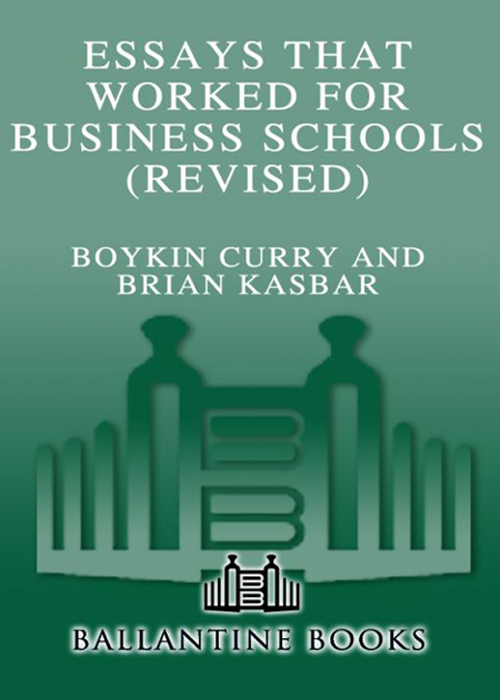
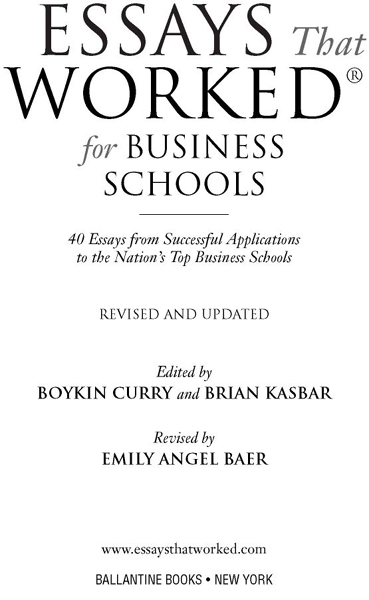
Table of Contents
For Roosevelt Evans, Joe Beckford, Walter A. Debboli Jr., and Bill Ohr
men of Yale without whom this book would not have been possible.
And for the young men of Memphis University School
students of today, leaders of tomorrow
ACKNOWLEDGMENTS
This book was created with the help of many students and admissions officers at some of the top business schools in America. We deeply appreciate the generosity of the applicants who let us reprint their essays and of the admissions officers who gave us their time, critiques, and advice.
We wish to extend our gratitude to David Webber at MIT, Eric Mokover at UCLA, Richard Silverman at Yale, Michelle Brown at Trinity University, and Diana Russell and Steve Denson at the Cox School of Business at Southern Methodist University.
Emily Angel Baer in particular thanks Tish Peterson for her comments, Eric Berman, and Ellis Haguewood for her comfortable office in which, on nights and weekends, she finished this project.
Boykin Curry
Brian Kasbar
Emily Angel Baer
Praise for the Original ESSAYS THAT WORKED
Outstanding.
The Journal of College Admissions
For inspiration on what makes a
memorable essay, read Essays That Worked.
Money Magazine
The best sort of teaching tool.
School Library Journal
The collection reveals as much about the sorts of
students who are applying to college as about
the application process itself.
The Chronicle of Higher Education
INTRODUCTION
How important is the essay on a business school application? To be honest, a persons record speaks much louder to us than his essay, one admissions officer told us.
We give it quite a bit of weight, said another.
Its at the heart of our entire process, said a third.
Along with your grades, your accomplishments, and, in some cases, your GMAT scores, the application essay can make the difference between your acceptance and rejection into an MBA program. For some schools, the essay is crucial. For others, it will only tip the balance of a borderline candidate.
After speaking with admissions officers at a number of business schools, we have tried to estimate just how important the essay is in the admissions process. The graph on page 2 shows our results. (Of course, the graph is in no way exact, and schools attitudes can change with new deans and admissions officers, but it does roughly represent our understanding of the schools current priorities.)
Also, note that several top business schools, particularly in the South, that have not required essays of past applicants are beginning to add them to their applications.
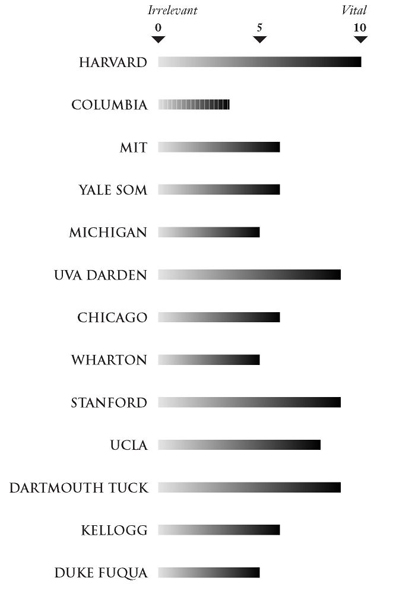
Over the years, each of the top business schools has developed a distinct personality. Harvard, for example, has churned out one-fifth of the major officers at Fortune 500 companies, while Yale encourages students to make a contribution to the public sector. In response to these reputations, many students become chameleons in their applications. They are executives for Harvard, math jocks for MIT, and dedicated public servants for Yale.
Of course, admission officers usually see through that ploy quickly, and even if they dont, youre probably just hurting your application when you try to apply as someone youre not. Inconsistencies between your essays and your record are easy to spot; sentiment and expertise are tough to fake. The brochures for several business schools stress general management, and one admissions officer told us that he is flooded with essays using the term general manager over and over in obsequious attempts to win a place. It can become so repetitive, he said, that I cant help but question the candidates sincerity. The term has become meaningless.
Obviously, you should emphasize the parts of your personality and record that coincide with the schools interests. But avoid overdoing it. Be selective, but be yourselfits the best sales pitch you can make.
In our book on undergraduate application essays, we discussed what kinds of content and tone were most appropriate in applying to college. Much of our advice holds true for business schools as well.
The overwhelming complaint from undergraduate admissions officers was that reading 13,000 essays on the same few topics in a span of three months is a mind-numbing experience. Most essays are dry and over-written. They are often corrected by so many friends and relatives that the life gets sucked out. One undergraduate admissions officer explained that few applicants understand what we want to read, and they rarely go out on a limb to be witty or controversial. Anxious applicants become so afraid of saying the wrong thing that they end up saying nothing. Such sterilization can mean unbearable monotony for the hapless admissions staff, so dont treat your essay like a psychological minefield. What seems safe to you is probably deadly boring to a weary admissions officer.
The officer at one top school resorts to dramatic measures to combat essay fatigue. I try to change the scenery when I read essays, he said. I read them in the park or out on my boat. You know what? Even that doesnt help.
You can imagine, then, the impact that a lively, original essay can have. For starters, you are noticed, and thats much of the battle. But also, you have done a favor for the tired readerand favors are often returned.
After reading the essays in this book, we hope you will understand better the boundaries of tone and content within which you can work, and we hope you see how large the boundaries are. Since these essays represent some of the best writing out of thousands of pieces submitted each year, they should inspire your creativity and help you feel more comfortable about the admissions process. As the essays demonstrate, you can be exciting and natural without resorting to outrageous gimmicks or immature poses. An accurate, enthusiastic reflection of your personality can make for a refreshingand we hope successfulessay. Good luck!
AN INTERVIEWwithanADMISSIONS OFFICER
Although different schools attach different levels of importance to the application essays, and although each school may be looking for a slightly different type of student, admissions officers have surprisingly similar desires. They want brevity. They want sincerity. They want mature enthusiasm. And a little humorwhen its truly humorousdoesnt hurt.
But as we perused the application questions and tried to compose our own answers, we found ourselves asking a number of questions. How business-like should we be? How much can we joke around? Can we relax and be the readers chum, or should we treat them like clients? Should we tell them what they want to hear, or should we be totally honest, even at the risk of being boring?
We asked these and other questions to dozens of admissions officers at almost every major business school in the country. The following is a condensed version of those interviews:
Whatsthedifferencebetweenapplicationessays forbusinessschoolandtheessayswewroteto
Next page

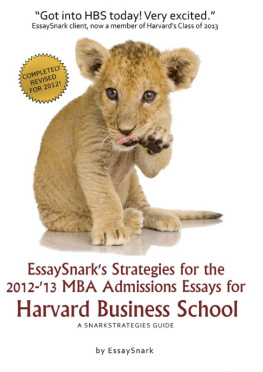
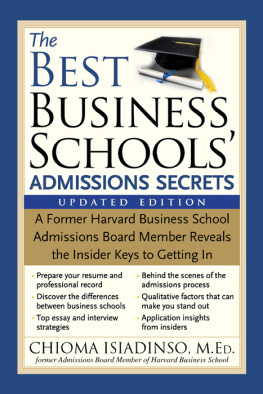
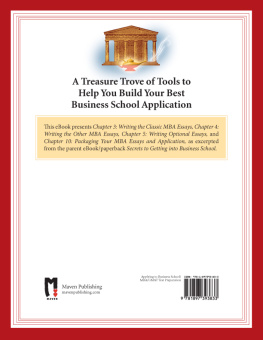
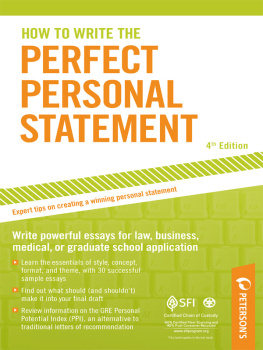
![Reding - Grads Guide to Graduate Admissions Essays] : Examples from Real Students Who Got into Top Schools](/uploads/posts/book/101661/thumbs/reding-grad-s-guide-to-graduate-admissions.jpg)


